Whether it’s viruses, plant diseases or other threats to a crop – one thing that's for sure is that new threats will definitely not be the last, and the second thing is that the best way to fight them is to be on top of them. What if the information on new threats will be shared amongst growers faster than the virus can?
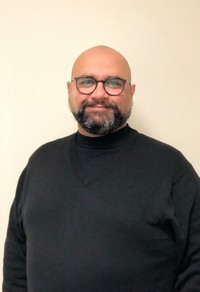 Almost a decade ago Saber Miresmaili of Ecoation started developing a machine that can do precisely that. Currently he and his team got a large amount of support from private investors and the Canadian Governement. At the same time six machines are sold and there are plans to expand. And then there’s yield prediction and climate conditions – also to be monitored and calculated with the same AI robotic horticultural future.
Almost a decade ago Saber Miresmaili of Ecoation started developing a machine that can do precisely that. Currently he and his team got a large amount of support from private investors and the Canadian Governement. At the same time six machines are sold and there are plans to expand. And then there’s yield prediction and climate conditions – also to be monitored and calculated with the same AI robotic horticultural future.
Saber Miresmaili with Ecoation
Ecoation developed and patented two robots, that together form a tool for growers to upgrade crop protection. The first one is OKO, a scissor lift that not only enables workers to lower, clip or twist the plants, but at the same time collects a large amount of data, offering insights on the crop and the expected yield.
IRIS, the other machine, is a fully autonomous scout robot that detects diseases, pests, deficiencies and other plant abnormalities at an early stage and also provides accurate fruit count and yield forecasting as well as detailed climate and environmental information.
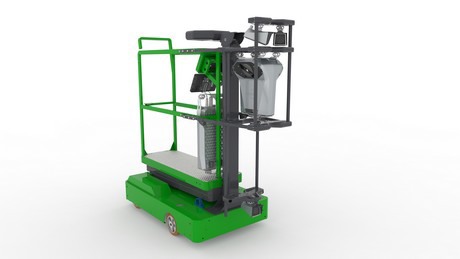
The OKO machine
One person, one scissor lift, five jobs
It might be easy to just call OKO a super high tech, advanced and expensive scissor lift – but that’s not what it embeds. Saber explains how the combination of a human scout and the OKO makes not two, or three, or even four, but five jobs possible. “Without the OKO it would take probably five people to do the same job. This doesn’t mean that the machine is going to take people’s scouting jobs away. It is just enabling them to be more effective in what they do. More precise, more accurate and able to see more than the human eye.” The same goes for information on labour and field work. “The sensors enable growers to monitor the quality of the crop work and if required, train people. It’s like a video referee: offering an unbiased reference.”
And there’s more. OKO is equipped with deep learning capabilities, over time recognizing pests and diseases faster, more accurate and earlier and also learning to recognize new disturbing factors in a crop. “Together with Delphy we have plans for training the machine on various different pests and diseases within the controlled environment of Canadian and Dutch greenhouses. After delivery, a grower can continue to do so in their own greenhouse.”
Then this scouting information can be transferred to a range of connected IRIS! robots - even when the company has several locations, spread out over the globe. “Following the learning curve of the OKO, the IRIS! robot can live up to this knowledge and flag issues immediately everywhere”, Saber explains. And since the IRIS! robots are not controlled by human supervision, these can work day and night. “The transfer learning aspect of the technology enables one location to use all training done with the OKO machine. In this way OKO is the training machine.”
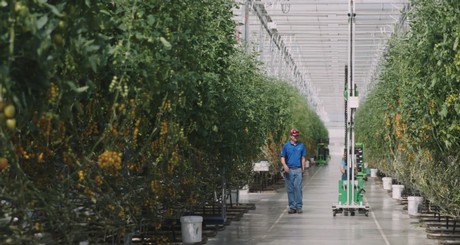
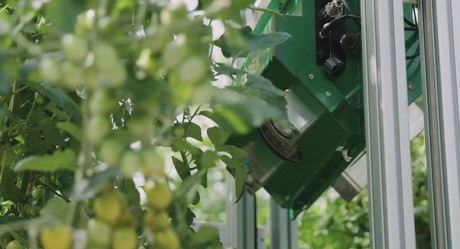
Screenshots from a recent video by Dell, showing how NatureFresh Farms works with the robots. Check it out here.
Crop protection data
Will this data remain private for the growers? Saber explains how the system will also collect data in an Ecoation alert system, sharing information about pests and diseases without mentioning any details of the grower or location. “We protect the growers privacy, while providing a cloud based library where everybody can see the symptoms of the virus so they can alert and educate themselves.”
He believes this to be of value to the whole industry. “We can see it now – stopping the spread of a new virus is not something you do for your own sake, but for the sake of the whole industry. Every year new problems will arise and we will have to train humans to scout and detect these. Thanks to machine learning, we can enable them to do this more effectively. If an OKO can learn to recognize a pest in a Spanish greenhouse and furthermore protect all Canadian greenhouses in doing so, that will benefit the industry as a whole. The best way to protect your crops from pests, viruses and diseases is to be on top of it: have a lot of data and control it automatically. That’s what we strive for.”
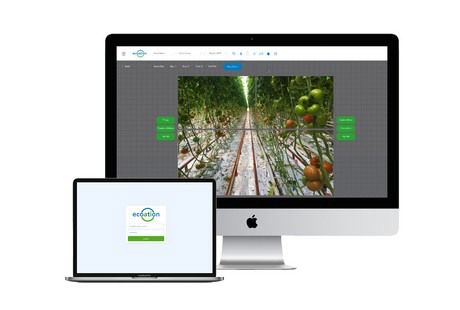
Lending a helping – robotic – hand
The first IRIS! machine is currently rolling through a Dutch greenhouse, at tomato grower Kees Stijger. Other supporters of the Ecoation machines include Casey Houweling and Pete Quiring – and they’re not the only ones.
In the past weeks, Ecoation received over $8M of funding: $5.2 from private investors and another $3M of the Federal government of Canada to commercialize the platform. Time for a bigger office, you would say; and Saber agrees. “However, thats only because our team is growing – and also to be honestly because the IRIS! didn’t fit in our current office elevator! We actually could not bring it to Canada because of that”, he laughs. “We’re opening an additional branch in Kingsville, Ontario this year as well to provide local support in North America. We want to expand to the Netherlands and EU as well – but that might take a year.”
And there’s more coming up. At the GreenTech show Ecoation will not only bring some machines and offer them to the market (even though they’re pretty much sold out for this year) but also announce various partnerships with various players in the market.
“Essentially we want to provide IPM as a service – not only monitoring, but also collaborating with providers of crop protection for example and making the machines capable of applying biological control agents or even UV lights to certain places in the crop. Just by adding a robotic arm and some equipment to the IRIS, it will become an alternative to chemical crop protection, an automated crop fixing solution. The same goes if somebody comes with a better system: we can attach it since our system is robust and modular. Our system will only be the learning and applying platform.”
For more information:
Ecoation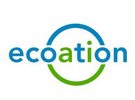
www.ecoation.com
info@ecoation.com
